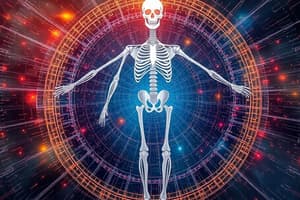Podcast
Questions and Answers
What does COG stand for?
What does COG stand for?
Center of Gravity
The summation of all forces at the Center of Gravity equals _____
The summation of all forces at the Center of Gravity equals _____
zero
Which of the following formulas is used to calculate the height of female COG from heel?
Which of the following formulas is used to calculate the height of female COG from heel?
- Total body height × 55.4 / 100 (correct)
- Total body height × 56.18 / 100
- Total body height + 1.4
- Total body height × 55.7 + 1.4 / 100
What is one method to determine the segmental COG?
What is one method to determine the segmental COG?
What height signifies the location of COG for a male subject of 170cm using the Palmar formula?
What height signifies the location of COG for a male subject of 170cm using the Palmar formula?
A lower COG leads to greater stability.
A lower COG leads to greater stability.
Which factors affect stability?
Which factors affect stability?
What is the definition of Base of Support (BOS)?
What is the definition of Base of Support (BOS)?
The line of gravity must fall within _____ to maintain balance.
The line of gravity must fall within _____ to maintain balance.
What happens to stability when the base of support is increased?
What happens to stability when the base of support is increased?
Flashcards are hidden until you start studying
Study Notes
Center of Gravity (COG)
- COG is a theoretical point where the body's weight is concentrated
- The body rotates freely around this point
- Sum of forces at this point is zero
- Sum of moments at this point is zero
Determining COG
- Mathematical methods are used:
- Croskey Formula (considers sex)
- Palmar Formula (doesn't consider sex)
- Segmental COG is calculated based on 14 or 16 body segments
- When segments are straight, COG is calculated by multiplying the segmental length by 4/7 and measuring from the distal end
- When segments are flexed, COG is calculated by considering the COG of each segment
Value of Determining COG
- Total COG:
- Helps determine the best stabilization points for patients, especially those with hemiplegia
- Useful for biomechanics to improve player performance
- Segmental COG:
- Important in amputations, ensuring the artificial limb's weight distribution matches the amputated limb
Stability
- Ability to maintain balance in static and dynamic situations without mechanical devices
Factors Affecting Stability
- Center of Gravity: Lower COG leads to greater stability
- Base of Support (BOS): Larger BOS increases stability. BOS includes areas of contact with the supporting surface and the space between them.
- Line of Gravity (LOG): The LOG is a vertical line from the COG. It must fall within the BOS for balance. The closer the LOG is to the center of BOS, the greater the stability.
Studying That Suits You
Use AI to generate personalized quizzes and flashcards to suit your learning preferences.




